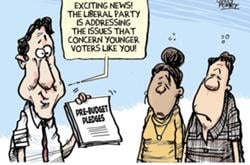
It was a rare moment in political history - a head of state delivering an uncomfortable and unpopular message.
Jean Chrétien did that when he made the link between poverty and terrorism in a CBC interview on the one-year anniversary of the September 11 terrorist attacks. His comments raised a storm of denials and denunciations and he was accused of blaming the victim when he called western nations, including America, "arrogant and self-satisfied" and "greedy". A few days later, in a speech to the United Nations, Chrétien stoked the fire again, pointing to the gap between rich and poor nations and saying the 9/11 attacks illustrated "the tragic consequences that can result from failed states in far-away places."
Of course, Chrétien was on his way to retirement, so he could say whatever he wanted.
While the idea that poverty contributes to terrorism may be as politically unpalatable as ever, many development experts consider it an incontrovertible fact.
Sachs in the city
One of the world's leading minds, American economist Jeffery Sachs, was in Vancouver recently to receive an honorary doctorate from Simon Fraser University. The Tyee sat down with him to discuss the link between security and economic development in failed states like Sudan and Afghanistan, which both share the dubious distinction of having harboured Osama bin Laden.
Sachs stressed the need for countries such as Canada to do more to stabilize and develop failed states. We need to bring their citizens into the global economy, he argued, for their sakes as well as ours.
"If we want to address the sources of insecurity in the world, if we want to have fewer wars, fewer havens for terror, fewer sites of mass illegality, we better think about development as one of the important tools that we have," said Sachs. "And the idea that we can approach problems of insecurity mainly by military means is a big mistake, because the underlying source of the instability is poverty."
Unfortunately, the sentiment is lost on the Bush administration, according to Sachs.
"We're investing the wrong way in our national security," said the economist. "In my country, we're investing thirty times more in the military than we are in development aid. I think we're getting a bum deal."
Celebrity economics
If the term "celebrity economist" seems like an oxymoron, that's because it probably is. But if anyone comes close to inhabiting the label, it's Sachs. After all, it's doubtful that even Alan Greenspan -- the heavyweight economist and longtime chief of the United States Federal Reserve -- could get Bono to write the introduction to his book.
Hanging out with rock stars is only the latest in a long list of Sachs' accomplishments. Tenured at Harvard at 28, he went on to become an economic advisor to governments such as Bolivia and Poland and was credited with halting economic meltdown in both countries. (His role in Russia's agonizing entry into the capitalist economy is more controversial.) He is currently the director of Columbia University's Earth Institute and a special advisor to U.N. Secretary General Kofi Annan. Time magazine recently included him on its list of the world's 100 most influential people.
Sachs has become one of the most passionate leaders of the call to end extreme poverty. It's rare to see an academic get emotional, but a warble creeps into his voice when he talks about the grueling poverty he has seen, especially in Africa. Perhaps most frustrating for Sachs, is that he believes he has found the answer to ending such misery. He lays out the plan in his best-selling book The End of Poverty and returns to it relentlessly in meetings, interviews and public speaking events. The plan is also set out in the recommendations of the U.N. Millennium Development Project, which Sachs directs.
The Millennium Project, which is now supported by all the U.N.'s member states, maps out the steps to ending extreme poverty by 2025. The goals are necessary and completely achievable, argues Sachs, but require rich countries to loosen the purse strings and commit 0.7 percent of their GDP to international aid.
How to not end poverty
The figure has taken on an almost mythical aura, having first been suggested by Lester Pearson in 1969. Paul Martin has said Canada will achieve this, but refuses to name a date as European countries such as Britain and France have. (Canada's foreign aid budget currently sits at 0.26 percent, or about $3 billion.)
Critics argue that we cannot afford to foot the bill to put underdeveloped countries on their feet. They also say it does no good to funnel money to corrupt governments in the third world. People like New York University economics professor and Africa expert William Easterly, who calls Sachs the "intellectual leader of the utopians", warn of the danger of the west promising what it can't deliver.
"Indeed, we have seen the failure of what was already a "big push" of foreign aid to Africa," writes Easterly in the journal Foreign Policy. "After 43 years and $568 billion…in foreign aid to the continent, Africa remains trapped in economic stagnation."
Rubbish, says Sachs. Previous aid packages were often tied to Cold War political maneuvering. Money was given to autocratic rulers who stole most of it, as autocratic rulers are wont to do. As a result, those countries now suffer crippling debt. We need to forgive the debt and invest in economic development, peacekeeping and governance. We need to allow the citizens of such countries to climb out of poverty and political chaos.
Our sense of security is only one of the costs of not doing these things.
What makes terrorists tick
Critics of the "poverty breeds terrorism" hypothesis point out that none of the London or Bali bombers, or the 9/11 hijackers were poor. Many were incensed when Chrétien proposed such a link in his post-9/11 remarks.
"To suggest, as Chrétien did, that it is somehow our own fault (as members of the western world) that terrorism breeds, is almost inconceivable," said Conservative Member of Parliament Carol Skelton at the time.
"These people were not poor," Skelton continued. "Were they fighting for the poor of their own nations? I can't say I've heard that reported as the root of their cause. Is it because of their poor countrymen that they scream, 'Death to America!'"
Stewart Bell reports on security issues for the National Post and has written two books about terrorism. He told The Tyee his research doesn't show any links between poverty and terrorism.
"Politicians like Chrétien and Pettigrew, who have given speeches claiming that poverty is the root of terror, don't know what they are talking about," said Bell.
"There is a far better case to be made that weak states and the lack of democracy contribute to terror," he added. "But in the end, terrorism is not really a response to social conditions, it is an ideology - the belief that it is acceptable to kill innocents in order to advance a cause."
Terror training grounds
Whether or not terrorists are motivated by global inequities of wealth, Sachs argues there is an obvious link between poverty and terrorism: chaotic, poverty-stricken countries provide the ideal conditions to train terrorists, as well as to plan and coordinate attacks. Stabilizing such countries diminishes the ability for terrorists to operate there. And economic development is essential to stabilization.
"The simplest thing to say is that very poor countries are extremely unstable," Sachs said. "They are subject to political violence, civil war, cross border war, coups and unconstitutional change of government."
"All of those are, of course, sources of insecurity for their own people and insecurity for their neighbours," he continued, "and they can become sources of insecurity for the wider world."
Many politicians and diplomats deny the importance of the link between poverty and terrorism even as they act on it. The White House rhetoric surrounding the invasions of Afghanistan and Iraq has increasingly focused on the idea that stabilizing and developing those countries will make the world safer from terrorists. It's just that in some cases the strategy could use some retooling, according to Sachs.
"I think the Iraq war is a horrendous mistake, and I think we're dramatically under-investing in these peaceful approaches that I'm talking about," he said.
Jared Ferrie is a regular contributor The Tyee.
Thanks to Tides Canada Foundation for sponsoring our Making the Connections series. Tides Canada is a national public foundation that offers professional giving services to donors who share a concern for social justice and environmental issues - locally, nationally and internationally.
















Tyee Commenting Guidelines
Comments that violate guidelines risk being deleted, and violations may result in a temporary or permanent user ban. Maintain the spirit of good conversation to stay in the discussion.
*Please note The Tyee is not a forum for spreading misinformation about COVID-19, denying its existence or minimizing its risk to public health.
Do:
Do not: